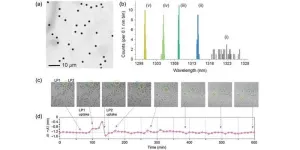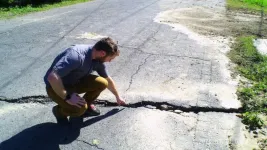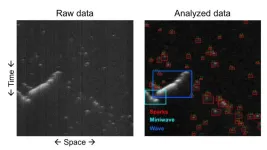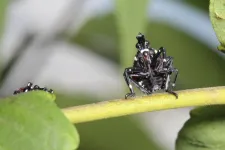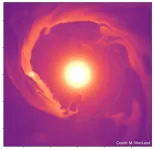(Press-News.org) ChatGPT could help to increase vaccine uptake by debunking myths around jab safety, say the authors of a study published in the peer-reviewed journal Human Vaccines and Immunotherapeutics.
The researchers asked the artificial intelligence (AI) chatbot the top 50 most frequently-asked Covid-19 vaccine questions. They included queries based on myths and fake stories such as the vaccine causing Long Covid.
Results show that ChatGPT scored nine out of 10 on average for accuracy. The rest of the time it was correct but left some gaps in the information provided, according to the study.
Based on these findings, experts who led the study from the GenPoB research group based at the Instituto de Investigación Sanitaria (IDIS) – Hospital Clinico Universitario of Santiago de Compostela, say the AI tool is a “reliable source of non-technical information to the public”, especially for people without specialist scientific knowledge.
However, the findings do highlight some concerns about the technology such as ChatGPT changing its answers in certain situations.
“Overall, ChatGPT constructs a narrative in line with the available scientific evidence, debunking myths circulating on social media,” says lead author Antonio Salas, who as well as leading the GenPoB research group, is also a Professor at the Faculty of Medicine at the University of Santiago de Compostela, in Spain.
“Thereby it potentially facilitates an increase in vaccine uptake. ChatGPT can detect counterfeit questions related to vaccines and vaccination. The language this AI uses is not too technical and therefore easily understandable to the public but without losing scientific rigor.
“We acknowledge that the present-day version of ChatGPT cannot substitute an expert or scientific evidence. But the results suggest it could be a reliable source of information to the public.”
In 2019, the World Health Organisation (WHO) listed vaccine hesitancy among the top 10 threats to global health.
During the pandemic, misinformation spread via social media contributed to public mistrust of Covid-19 vaccination.
The authors of this study include those from the Hospital Clinico Universitario de Santiago which the WHO designated as a vaccine safety collaborating center in 2018.
Researchers at the center have been exploring myths around vaccine safety and medical situations that are falsely believed to be a reason not to get vaccinated. These misplaced concerns contribute to vaccine hesitancy.
The study authors set out to test ChatGPT’s ability to get the facts right and share accurate information around Covid vaccine safety in line with current scientific evidence.
ChatGPT enables people to have human-like conversations and interactions with a virtual assistant. The technology is very user-friendly which makes it accessible to a wide population.
However, many governments are concerned about the potential for ChatGPT to be used fraudulently in educational settings such as universities.
The study was designed to challenge the chatbot by asking it the questions most frequently received by the WHO collaborating center in Santiago.
The queries covered three themes. The first was misconceptions around safety such as the vaccine causing Long Covid. Next was false contraindications – medical situations where the jab is safe to use such as in breastfeeding women.
The questions also related to true contraindications – a health condition where the vaccine should not be used – and cases where doctors must take precautions e.g. a patient with heart muscle inflammation.
Next, experts analyzed the responses then rated them for veracity and precision against current scientific evidence, and recommendations from WHO and other international agencies.
The authors say this was important because algorithms created by social media and internet search engines are often based on an individual’s usual preferences. This may lead to ‘biased or wrong answers’, they add.
Results showed that most of the questions were answered correctly with an average score of nine out of 10 which is defined as ‘excellent’ or ‘good’. The responses to the three question themes were on average 85.5% accurate or 14.5% accurate but with gaps in the information provided by ChatGPT.
ChatGPT provided correct answers to queries that arose from genuine vaccine myths, and to those considered in clinical recommendation guidelines to be false or true contraindications.
However, the research team does highlight ChatGPT’s downsides in providing vaccine information.
Professor Salas, who specializes in human genetics, concludes: “Chat GPT provides different answers if the question is repeated ‘with a few seconds of delay’.
“Another concern we have seen is that this AI tool, in its present version, could also be trained to provide answers not in line with scientific evidence.
“One can ‘torture’ the system in such a way that it will provide the desired answer. This is also true for other contexts different to vaccines. For instance, it might be possible to make the chatbot align with absurd narratives like the flat-earth theory, deny climate change, or object to the theory of evolution, just to give a few examples.
“However, it's important to note that these responses are not the default behavior of ChatGPT. Thus, the results we have obtained regarding vaccine safety can be probably extrapolated to many other myths and pseudoscience.”
END
ChatGPT is debunking myths on social media around vaccine safety, say experts
2023-09-04
ELSE PRESS RELEASES FROM THIS DATE:
Growing evidence supporting the protein leverage hypothesis
2023-09-04
Humans, like many other species, regulate protein intake more strongly than any other dietary component and so if protein is diluted there is a compensatory increase in food intake. The hypothesis proposes that the dilution of protein in modern-day diets by fat and carbohydrate-rich processed foods is driving increased energy intake as the body seeks to satisfy its natural protein drive - eating unnecessary calories until it does so.
This paper, resulting from the Royal Society Discussion Meeting held in London last October, shows that observational, experimental and mechanistic research increasingly supports ...
Why breast cancer survivors don't take their medication, and what can be done
2023-09-02
For roughly 80% of breast cancer survivors, treatment doesn’t end with surgery, radiation and chemotherapy. Instead, for the next five to 10 years, doctors recommend that they take medication to block sex hormones, which can fuel tumor growth and spark recurrence.
The drugs are life-saving: They’ve been shown to cut risk of cancer recurrence by as much as half in patients with hormone receptor-positive tumors (HR+)—the most common form of breast cancer. Yet despite their promised benefits, 40% of patients stop taking them early and a third ...
New scalable, etching-based technique for precise tuning of microdisk lasers
2023-09-02
Micro- and nanodisk lasers have recently emerged as promising optical sources and probes for various applications in the fields of nanophotonics and biomedicine. Their ability to achieve lasing at a deterministic wavelength and ultra-narrowband precision is critical for several applications in on-chip photonic communications, on-chip bioimaging, biochemical sensing, and quantum photonic information processing. However, the large-scale fabrication of such precise wavelength micro- and nanodisk lasers remains challenging. Current nanofabrication processes introduce randomness in ...
Seismologists use deep learning for improved earthquake forecasting
2023-09-02
For more than 30 years, the models that researchers and government agencies use to forecast earthquake aftershocks have remained largely unchanged. While these older models work well with limited data, they struggle with the huge seismology datasets that are now available.
To address this limitation, a team of researchers at the University of California, Santa Cruz and the Technical University of Munich created a new model that uses deep learning to forecast aftershocks: the Recurrent Earthquake foreCAST (RECAST). In a paper published today in Geophysical Research Letters, the scientists show how the deep learning model is more flexible ...
Software developed at UC Davis analyzes calcium ‘sparks’ that can contribute to arrhythmia
2023-09-01
(SACRAMENTO, Calif.) — A team of UC Davis and University of Oxford researchers have developed an innovative tool: SparkMaster 2. The open-source software allows scientists to analyze normal and abnormal calcium signals in cells automatically.
Calcium is a key signaling molecule in all cells, including muscles like the heart. The new software enables the automatic analysis of distinct patterns of calcium release in cells. This includes calcium "sparks," microscopic releases of calcium within cardiac cells associated ...
Could insights from ants help people build better transportation networks?
2023-09-01
Key takeaways
Ants can either forage for food as individuals or recruit other members of their colonies to help search for or carry food back to their nests.
UCLA biologists found that the strategies ants use to forage play a bigger role in how they build their nests than innate, evolutionary “blueprints” do.
When building nests, ants strike a balance between transportation efficiency and architectural constraints. Researchers say that observation could help humans design more efficient transportation systems tailored to specific needs.
Could ants’ nests hold the secret to reducing traffic congestion on the 405 Freeway?
In a new study, UCLA biologists ...
Invasive spotted lanternfly may not damage hardwood trees as previously thought
2023-09-01
UNIVERSITY PARK, Pa. — In 2012, when the spotted lanternfly (Lycorma delicatula) arrived in the U.S. from its home in China, scientists, land managers, and growers were understandably concerned that the sap-feeding insect would damage native and commercial trees. New long-term research led by Penn State has discovered that hardwood trees, such as maple, willow and birch, may be less vulnerable than initially thought.
“Since the lanternfly was first introduced to the northeastern U.S., the question has been, ‘How at-risk are our forests?’ said Kelli Hoover, professor of entomology at Penn State. “So far, we haven't had a good answer. Our study is the first ...
$26M NIH grant addresses environmental influences on child health
2023-09-01
EAST LANSING, Mich. – Backed by a $26 million federal grant, researchers at three Michigan universities, a leading health care system, and a state agency will continue a long-term study of how exposure to environmental factors during pregnancy and early childhood can impact health for a lifetime.
The funding from the National Institutes of Health, or NIH, is for the second phase of a national research program called ECHO, which stands for the Environmental Influences on Child Health Outcomes, and includes a sample of mothers, infants and children from across the United States. The first phase began in 2016.
“This award shows the research ...
LDL not the be all, end all in heart disease, heart attacks and stroke
2023-09-01
Milwaukee, Wis. – Sept. 1, 2023 – Despite advances in treatment for high cholesterol, heart disease remains the leading cause of death in the U.S. Scientists at the Medical College of Wisconsin (MCW) are investigating the role of a form of cholesterol called very-low-density lipoprotein – and their findings may lead to new treatment options in the future.
The research team is led by Ze Zheng, MBBS, PhD, MCW assistant professor of medicine (endocrinology and molecular medicine); co-leader of the MCW Cardiovascular Center’s Atherosclerosis, Thrombosis ...
Hot Jupiter blows its top
2023-09-01
A planet about 950 light years from Earth could be the Looney Tunes’ Yosemite Sam equivalent of planets, blowing its atmospheric ‘top’ in spectacular fashion.
The planet called HAT-P-32b is losing so much of its atmospheric helium that the trailing gas tails are among the largest structures yet known of an exoplanet, a planet outside our solar system, according to observations by astronomers.
Three-dimensional (3D) simulations on the Stampede2 supercomputer of the Texas Advanced Computing Center (TACC) helped model the flow of the planet’s atmosphere, ...
